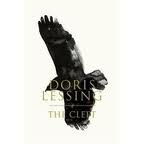
‘The Cleft’ by Doris Lessing
Harper Perennial
No. of pages 260
While purchasing books, it is possible to be blinded by our love for some authors. Even if the back cover and the synopsis promise no excitement. For me, Doris Lessing is one such name.
‘The Cleft’ has a brazenly feminist hypothesis about evolution as its premise, the source of which is conspicuous by its absence. Hypothetically then, females were the ‘primal stock’ while males were ‘a kind of cosmic afterthought’. Lessing spins a tale around this theory, the defining moment being the birth of the first male among an amphibious society of females, ‘The Clefts’. Initially, attempts are made to kill male babies at birth but over time, with physical help from eagles in preservation and by some rebellious Clefts in multiplication, a male community comes to rise, ‘The Squirts’ at some distance from The Clefts. The story is conveyed to us through the perspective of an aging Roman senator who attempts an imaginative reconstruction of this novel tale of human origin. For this, he draws upon remnants of the documented annals of both clans that have been made available to him.
For a story attempting to understand archetypes of human behavior, one does not expect ground-breaking psychological insight of course. That men and women are both driven by the sexual urge, women whine a lot and men don’t help out enough with the chores….pretty much the regular deal. However, what one does expect is a well-spun yarn.
If the book qualifies as that, it is by a narrow margin. The prose, although poised throughout, lacks imaginative force. Even if we disarm ourselves of our post-modernist ideas of ‘character’ which echo individuality and distinctness and transpose ourselves back into the time, to an un evolved society of females where character was synonymous with prototype, the portrayal of the Clefts is defeatist and unexciting. Not to mention unflattering. These first females, whose essence, over time, condensed itself into the essence of deities, are, in the most lenient appraisal, sluggish, narrow-sighted, unimaginative, cautious and earthbound. Differently worded, solid. This ‘solidity’ alone is a mark of their superiority according to the fantastical theory that Lessing subscribes to.
Ironically and unforgivably, the narrative goes on to prove the exact opposite. The Clefts are unable to identify the scarcity of resources that would ultimately be facing due to their increasing numbers. It is Horsa, the leader of males, who ventures out for more abundant resources for the two clans. His foresight, initiative and bravery save the day. Survival, then, translates into a victory of the imagination, after all and not that of stubborn shortsightedness or whichever name it goes by.
This embarrassment only reinforces other lacunas and loose ends in the plot. The scraps that the narrator used could’ve been more imaginatively resuscitated and more artfully brought to use; citing from the original document would’ve been immensely superior to the diluted paraphrase by the senator. I, for one, was left yearning for more than the two oft-repeated snippets. The interwoven musings of the narrator have great rhetoric power in parts but are banal for the most and add no value.
Where one expected a perfective maestro’s stroke, one gets a novel surprisingly amateurish both in conception and execution. Although a touch bland, it might retain for some the lure of a grandma’s tale. Settle down at grandma’s knee if you will, but only if you’re willing to forgive grandma some failings. If only out of love.

Leave a Reply